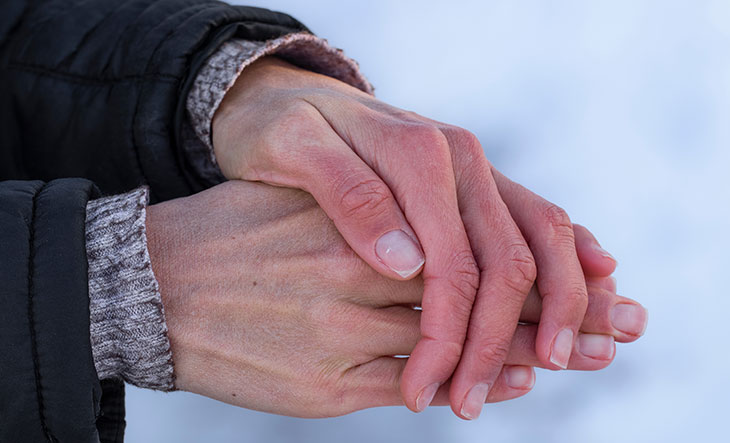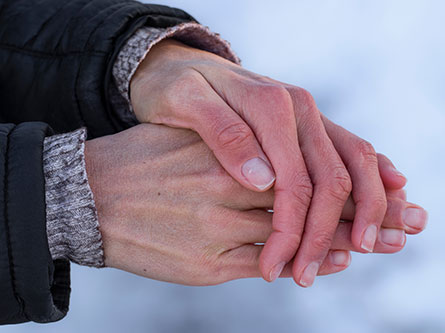
Many of us have itchy, red or dry skin during the cold winter months.
What can you do to combat winter skin? Our dermatologists have some tips to protect your skin and keep it hydrated.
Why is your skin so dry and itchy in the winter?
We get dry skin in the winter mainly because we turn up the heat indoors. This creates a dry environment with low humidity levels. And if you wash your hands often in the low humidity, you can end up with dry, rough hands.
With the cold outside and dry inside, you start losing water through the outer layer of your skin. Water loss through your skin increases by about 25% in the winter.
How should you care for and hydrate your skin in winter?
You want to lock in moisture to prevent dry skin before it starts. Using a cream on your entire body adds a barrier that can prevent water loss. Avoid creams with preservatives or scents. These can sometimes irritate the skin or lead to allergies.
If you use products with retinol, that can dry out your skin. While you don't have to stop using it, just don't use it every day. It's also best to apply retinol at night.
You can also use a humidifier in your home to increase the humidity while you have the heater turned up.
Which moisturizer is best for dry skin in winter?
It's important to note that the type of moisturizers you use should be different in summer and winter. In the summer, our skin requires less moisturizer because of typically higher humidity levels. You can get away with using thinner lotions, such as the kinds that come in pump bottles.
However, in the winter, you should use thicker moisturizers that often come in jars. You can also use ointments or petroleum jelly to help keep your skin from drying out. Use a thick cream at night to lock in extra moisturize.
The bottom line is that you want a cream not a lotion. Lotions are mostly water, which don't protect against water evaporation in the skin. Creams better protect and hold in that water in your skin.
Explore more tips to combat itchy, dry skin this winter
What should I do if the backs of my hands are really dry and burning?
If you skin is burning or cracked, use moisturizing ointments like petroleum jelly. Also, apply thicker creams or moisturizers at night. You can also buy nitrile gloves from the grocery or drug store to wear at night. These gloves help lock in moisture while you sleep.
If your hands are still burning, talk to a dermatologist to get help.
See our team of dermatologists ready to care for your skin
With handwashing, does the type of soap matter to help keep hands from drying out?
It's important to wash your hands a lot to prevent against colds, flu, COVID-19, and other illnesses. Antibacterial soap and gels are the best in public settings. However, at home you can use mild, scent-free soaps. Avoid products that contain alcohol at home. Always moisturize after each time you wash your hands.
Learn about the differences between COVID and the flu
Check out seven facts about the flu and why you should get a flu shot
Should I wear sunscreen even if the darker winter months?
Yes. Sunscreen should be applied daily, even if it's overcast. UV rays pass through clouds and penetrate the skin, which stresses the skin's moisture barrier. UV exposure, even on a cloudy day, can lead to more skin damage, precancers or skin cancer, and premature aging.
For those who live in or visit regions that get snow, you especially want to keep using sunscreen. Snow reflects UV rays, which can damage not just your skin, but also your vision.
Always wear sunscreen with SPF 30 or higher. You can apply sunscreen after you've applied moisturizer.
Find out more about sunscreen, SPF and protecting your family
Should I change the way I shower in the winter?
Hot water in a shower may feel nice to warm up. However, long hot showers are really bad for your skin. Hot water removes more of the skin's natural oils, causing water from your skin to evaporate faster. Instead, use warm – not hot – water, and choose showers over baths.
Use gentle, fragrance-free cleansers rather than soaps. It's best to pat, not wipe, excess water from your skin with a towel. Experts recommend that you moisturize within five minutes of getting out of the shower.
Check out this winter skin survival kit
This blog was medically reviewed by Oma Agbai. She is a dermatologist and director of Multicultural Dermatology and Hair Disorders.




